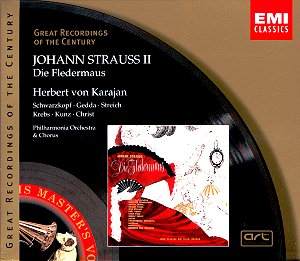This is just the recording to demonstrate to the next
generation that oper(a)(etta) is an art form with almost limitless potential.
They must go through their designer clothes and computer games years
to emerge into their teens when a gift of this CD would reveal a new
world. Many generations have come to music via one work. For many the
road to opera is this work. And this is a definitive version of it.
It is not ‘the’ definitive version because no such recording exists.
What appeals particularly to you may not to me and vice versa. That
said I would lay a fair number of shirts on first that you would be
hard put to assemble a more deservedly respected group of singers and
second that all were on top form on recording day.
At that point my shirts return to their drawer or rail,
because not everyone will agree about the input of the producer Walter
Legge nor all the tempi of Karajan. Personal preferences, so often influenced
by up bringing, come to the fore. The detailed accompanying booklet
notes tell us that Legge handpicked the cast, freely edited the dialogue
and, with Karajan, sought and received a "grit, dash and pep" Rosalinde
from Schwarzkopf. All of which is evident and to which I will return.
The overall achievement is the quality of the singing.
There is not even a hint of weakness in any of the links. As the orchestrator
of the entertainment the performance of the golden baritone of Erich
Kunz as Dr. Falke is faultless. He enjoyed his role and it shows.
That lays the groundwork for Nicolai Gedda (Eisenstein)
and Elisabeth Schwarzkopf (Rosalinde) to play their roles in the Bat’s
revenge. Eisenstein’s vocal demands are but nothing to Gedda. His irascibility
with Dr. Blind is rapidly replaced by effervescent excitement with the
rounded full voice of Falke; through the hesitant mistaken identity
of Adele; into the creamy attempted seduction of Rosalinde and via final
self-righteous indignation in prison to marital reconciliation. Gedda
meets every demand and appears to have voice to spare.
We know, because the notes tell us, that Schwarzkopf
was asked for ‘grit’. That is what we receive. Here is the powerful
pure voice giving us that with edginess in the timbre. Personal preference
makes me hesitate over the interpretation. ‘Outrage’ may be Rosalinde’s
response to a requested parting kiss but she cannot show that without
deflecting the plot from its course. She must give in and knows that
pragmatism must rule. At the Ball the edginess is apparent to us but
not Eisenstein who hears only the playful perfect note hitting teasing
and misses the ‘hidden steel'. That is given rein in the denouement.
Whatever your view of the interpretation this is an awesome performance.
The Adele of Rita Streich is wholly entertaining. Here
is a soubrette played with supreme insouciance. Her ringingly clear
Mein Herr Marquis…is delivered with light delicacy and refinement
on the one hand mixed with mockery on the other.
Helmut Krebs is supremely relaxed as Alfred. He sings
the role with apparent effortless ease allowing his voice to soar off
stage, both initially and in prison. On stage his timbre is in excellent
contrast to that of Gedda. His is the gay cavalier in wooing, careless
of his own fate and that of others. Enjoyment is all: and it is patent.
Instead of the somewhat difficult soprano role for
Orlofsky which on some recordings comes out with false heartiness, here
tenor Rudolph Christ sings the role with a languid ennui which pervades
each phrase until the revenge is making real progress when there is
a hint of enthusiasm, but no more. Of all the refinements from the conventional
production this is the one that stands best – particularly where the
vocal tone is so well controlled
The Frank of Karl Dönch and the Dr Blind of Erich
Majkut complete the singing roles. Dönch is all that could be asked
from prison governor and Chevalier Chagrin. Majkut’s excellent subservience
and worsening stammer is perfect for imitation, which Gedda does so
well in the prison scene.
Thus far I have looked at the individuals: now take
them singing with each other. On every occasion the sum is greater than
the component parts. It is unfair to select any particular vocal combination:
whereupon many reviewers do so. I shall not. I shall just say: listen
in rapt admiration to voices together, which make sounds to delight
the ear.
Vocally Walter Legge cannot be faulted in his choice
of individual voices or his concept of their varied combinations. I
was less comfortable with his libretto refinements.
As accompanists to singing, the orchestra are well
balanced with the voices. At other times they are superbly drilled and
their military precision is almost breathtaking. But, for me, in the
waltzes there is too much parade ground and not enough ballroom. Compare
this production with the recording Karajan made five years later (Decca
4211 046) with its creamy orchestral touches and lyrical waltzes.
Which leaves the speaking roles and particularly Franz
Böheim as Frosch. This is a mature performance of what is now considered
the unacceptable face of drunkenness. I doubt if the next generation
will find this as diverting as earlier generations; but that cannot
detract from the quality of the performance
No more. This is a vocally definitive version. Die
Fledermaus with an assembly of voices which it is difficult if not impossible
to improve upon. It is a great recording. If you do not buy it for yourself
buy it for a young friend and let the genie of the operetta dance for
them.
Robert McKechnie

![]() Rosalinde Elizabeth
Schwarzkopf (soprano)
Rosalinde Elizabeth
Schwarzkopf (soprano) ![]() EMI Classics CMS 567074
[CD1: 41.11 CD2: 68.52]
EMI Classics CMS 567074
[CD1: 41.11 CD2: 68.52]